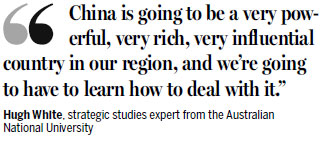Australia urged to back Belt & Road
Nation needs to 'think seriously' about initiative and its benefits
CANBERRA - Australian business people and academics are calling on the government to be more flexible on the Belt and Road Initiative, especially in the case of developing northern Australia.
Shadow Foreign Minister Penny Wong said at a foreign policy forum organized by the Australian National University on Tuesday that Australia should establish a China policy "that begins with what China actually is, rather than through the lens of risk management".
Talking about the Belt and Road Initiative, she said that "we need a policy that looks at the Belt and Road Initiative with an eye to identifying points of mutual interest and complementarity rather than reflexive negativity. We should be prepared to look at individual initiatives under the BRI and, where determined on a case-by-case basis, pursue those that accord with our national interests."

Proposed by China in 2013, the Belt and Road Initiative aims to build trade and infrastructure networks connecting Asia with Europe and Africa on and beyond the ancient Silk Road routes. It comprises the Silk Road Economic Belt and the 21st Century Maritime Silk Road.
Amy King, a senior lecturer at the Strategic and Defence Studies Centre at the ANU's Coral Bell School of Asia-Pacific, said Australia should "think seriously what the Belt and Road Initiative is and what it means for the region" before taking a cold stance on it.
She suggested that Australia should investigate whether there are aspects of the Belt and Road Initiative in which it would like to cooperate with.
Professor Hugh White, a strategic studies expert from the Australian National University, said that Australia's Northern Territory - which is far from the major cities of Sydney And Melbourne - would benefit greatly from attracting Chinese investment.
He said the Northern Territory's economic growth was slower than that of the rest of Australia, and considering its proximity to Southeast Asia, it would "seem pretty logical" to sign up to the initiative.
"China is going to be a very powerful, very rich, very influential country in our region, and we're going to have to learn how to deal with it," White told the Australian Broadcasting Corporation on Tuesday.
"If you look at it from an economic point of view - and you look at the way it connects us with the government's own plans for northern Australian development - it would seem pretty logical to sign up."
White's sentiment is shared by the president of the Northern Territory chapter of the Australia China Business Council, Daryl Guppy, who has already begun showcasing Territory-based businesses in China.
"The reality is we don't have our own internal domestic funding that will help develop northern Australia," Guppy said.
"This is the sort of thing we're interested in: being able to attract Chinese investment to help with develop the north long-term infrastructure program."
Xinhua
(China Daily 08/10/2017 page11)








